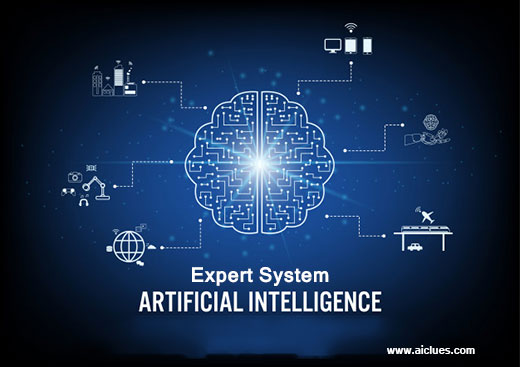
An expert system is a computer program that uses artificial intelligence (AI) technologies to simulate the judgment and behavior of a human or an organization that has expertise and experience in a particular field 1. Expert systems are designed to solve complex problems by reasoning through bodies of knowledge, represented mainly as if–then rules rather than through conventional procedural code 23. They became popular in the 1980s as a way to bring AI into the mainstream 1.
Expert systems are usually intended to complement human experts rather than replace them 1. They help distribute the expertise of a human and decrease the cost of consulting an expert for various domains such as medical diagnosis 3. One expert system may contain knowledge from more than one human expert, thus making the solutions more efficient 3.
how do expert systems work

Expert systems use artificial intelligence (AI) technologies to simulate the judgment and behavior of a human or an organization that has expertise and experience in a particular field 1. They are designed to solve complex problems by reasoning through bodies of knowledge, represented mainly as if–then rules rather than through conventional procedural code 23.
Expert systems use a combination of rules and heuristics to reason through problems and come up with solutions 2. The knowledge base is typically created by human experts in the field and then encoded into the expert system by a programmer 2.
So other than you ask, the expert system asks you a few questions and based on your answers the system concludes a final decision or recommends an action or diagnostics.
Modern expert knowledge systems use machine learning and AI to simulate the behavior or judgment of domain experts. These systems can improve their performance over time as they gain more experience, just as humans do 3.
Learn more:
examples of expert systems
There are many examples of expert systems in various fields. Here are some examples:
- MYCIN: It was one of the earliest expert systems based on backward chaining and could identify various bacteria that could cause acute infections. It could also recommend drugs based on the patient’s weight 12.
- DENDRAL: It is a molecular structure prediction tool for chemical analysis 3.
- PXDES: It predicts the kind and extent of lung cancer 3.
- Prospector: It is an expert system that helps geologists to identify minerals in rock samples 2.
- XCON: It is an expert system that helps configure orders for VAX computers 2.
These are just a few examples of expert systems. There are many more in various fields such as finance, medicine, engineering, and more.
Learn more:
What are the advantages of using expert systems?
Expert systems have several advantages over traditional computer programs. Here are some of them:
- Increased accuracy: Expert systems can provide more accurate results than traditional computer programs because they are based on the knowledge and experience of human experts .
- Reduced costs: Expert systems can reduce costs by automating tasks that would otherwise require human experts .
- Increased speed: Expert systems can perform tasks much faster than humans because they can process large amounts of data quickly .
- Consistency: Expert systems can provide consistent results because they follow the same rules every time .
- Improved decision-making: Expert systems can help improve decision-making by providing recommendations based on the knowledge and experience of human experts .
Expert systems have been used in various fields such as finance, medicine, engineering, and more. They have proven to be very useful in automating tasks that would otherwise require human experts.
What are the disadvantages of using expert systems?
Expert systems have several disadvantages as well. Here are some of them:
- Limited scope: Expert systems are designed to solve specific problems and cannot be used for general problem-solving.
- Lack of common sense: Expert systems lack common sense and cannot make decisions based on intuition or experience outside their domain.
- Costly: Developing an expert system can be expensive because it requires the expertise of human experts and programmers.
- Maintenance: Expert systems require regular maintenance to keep them up-to-date with the latest knowledge and technology.
- Lack of flexibility: Expert systems are not very flexible and cannot adapt to new situations or problems that they were not designed for.
Despite these disadvantages, expert systems have proven to be very useful in automating tasks that would otherwise require human experts.
What is the future of expert systems?
Expert systems have been around for several decades and have evolved significantly over the years. While they are not as popular as they once were, they still have a place in modern technology. Here are some possible future trends for expert systems:
- Integration with other technologies: Expert systems are likely to be integrated with other technologies such as machine learning and natural language processing to improve their capabilities.
- Increased use in healthcare: Expert systems are likely to be used more extensively in healthcare to help diagnose diseases and provide treatment recommendations.
- Increased use in finance: Expert systems are likely to be used more extensively in finance to help with fraud detection and risk management.
- Increased use in customer service: Expert systems are likely to be used more extensively in customer service to provide personalized recommendations and support.
These are just some possible future trends for expert systems. As technology continues to evolve, it is likely that expert systems will continue to play an important role in various fields.
Learn more:
History
Soon after the dawn of modern computers in the late 1940s and early 1950s, researchers started realizing the immense potential these machines had for modern society. One of the first challenges was to make such machines capable of “thinking” like humans – in particular, making these machines capable of making important decisions the way humans do. The medical/healthcare field presented the tantalizing challenge of enabling these machines to make medical diagnostic decisions.[9]
Thus, in the late 1950s, right after the information age had fully arrived, researchers started experimenting with the prospect of using computer technology to emulate human decision making. For example, biomedical researchers started creating computer-aided systems for diagnostic applications in medicine and biology. These early diagnostic systems used patients’ symptoms and laboratory test results as inputs to generate a diagnostic outcome.[10][11] These systems were often described as the early forms of expert systems.
Source: Expert system – Wikipedia
Basic software components
An expert system is an example of a knowledge-based system. Expert systems were the first commercial systems to use a knowledge-based architecture. In general view, an expert system includes the following components: a knowledge base, an inference engine, an explanation facility, a knowledge acquisition facility, and a user interface.[42] [43]
The knowledge base represents facts about the world. In early expert systems such as Mycin and Dendral, these facts were represented mainly as flat assertions about variables. In later expert systems developed with commercial shells, the knowledge base took on more structure and used concepts from object-oriented programming. The world was represented as classes, subclasses, and instances and assertions were replaced by values of object instances. The rules worked by querying and asserting values of the objects.
The inference engine is an automated reasoning system that evaluates the current state of the knowledge-base, applies relevant rules, and then asserts new knowledge into the knowledge base. The inference engine may also include abilities for explanation, so that it can explain to a user the chain of reasoning used to arrive at a particular conclusion by tracing back over the firing of rules that resulted in the assertion.[44]
Source: Expert system – Wikipedia





Leave a comment